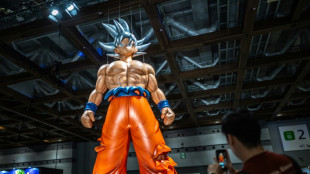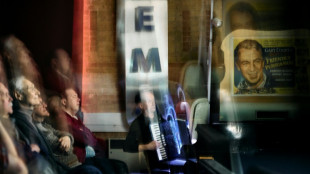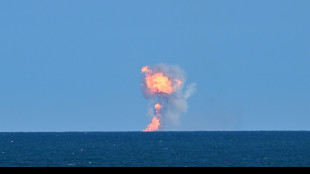
-
 Magritte painting nets auction record of $121 million
Magritte painting nets auction record of $121 million
-
Markets fluctuate as traders weigh geopolitical tensions

-
 N. Korea's latest weapon? Bombarding South with noise
N. Korea's latest weapon? Bombarding South with noise
-
'Kidnapped' Uganda opposition figure Besigye to appear at military court: lawyer

-
 Asian markets fluctuate as traders weigh geopolitical tensions
Asian markets fluctuate as traders weigh geopolitical tensions
-
'An inauspicious day': the landmines ruining Myanmar lives

-
 UN to vote again on Gaza ceasefire, US plans unclear
UN to vote again on Gaza ceasefire, US plans unclear
-
Japan's manga powerhouse 'Dragon Ball' turns 40

-
 Japanese, Koreans bottom of global love life survey
Japanese, Koreans bottom of global love life survey
-
Son blames 'mistakes' after South Korea held by Palestine in qualifier

-
 Japan ramps up tech ambitions with $65 bn for AI, chips
Japan ramps up tech ambitions with $65 bn for AI, chips
-
Lights, action, melodrama! Silent films get new reel at London haven

-
 Myanmar led world in landmine victims in 2023: monitor
Myanmar led world in landmine victims in 2023: monitor
-
ICC to sentence Timbuktu war criminal

-
 Ugandan opposition figure Besigye 'kidnapped', says wife
Ugandan opposition figure Besigye 'kidnapped', says wife
-
Australia's Jason Day eyes more major glory after resurgence

-
 Machu Picchu security boosted after visitors spread human ashes
Machu Picchu security boosted after visitors spread human ashes
-
Popovic hails Australia character in 'crazy' World Cup qualifier

-
 Taliban govt clearing 'un-Islamic' books from Afghanistan shelves
Taliban govt clearing 'un-Islamic' books from Afghanistan shelves
-
Argentina beat Peru as Uruguay hold Brazil

-
 Asian markets struggle as traders weigh geopolitical tensions
Asian markets struggle as traders weigh geopolitical tensions
-
Tatum stars as Celtics end Cavaliers unbeaten start

-
 Hurting India under pressure in blockbuster five-Test Australia series
Hurting India under pressure in blockbuster five-Test Australia series
-
'They killed her dream': Israel strike leaves woman footballer in coma

-
 Iraq holds its first census in nearly 40 years
Iraq holds its first census in nearly 40 years
-
Iraqis face tough homecoming a decade after IS rampage

-
 Russian net tightens around last civilians left in eastern Ukraine
Russian net tightens around last civilians left in eastern Ukraine
-
Olympic champion Tebogo aims to inspire next generation of African athletes

-
 Valencia on target as ten-man Ecuador upset Colombia
Valencia on target as ten-man Ecuador upset Colombia
-
'Rust' to premiere three years after on-set shooting

-
 Strike at French cognac maker Hennessy over measures in China spat
Strike at French cognac maker Hennessy over measures in China spat
-
Xi, Lula meet in Brasilia to 'enhance ties'

-
 SpaceX fails to repeat Starship booster catch, as Trump watches on
SpaceX fails to repeat Starship booster catch, as Trump watches on
-
'I have left a legacy': Nadal retires from tennis

-
 US recognizes Venezuela opposition's Gonzalez Urrutia as 'president-elect'
US recognizes Venezuela opposition's Gonzalez Urrutia as 'president-elect'
-
European powers, US seek to censure Iran at UN nuclear watchdog board

-
 UNAIDS chief says husband, Ugandan opposition figure Besigye, 'kidnapped'
UNAIDS chief says husband, Ugandan opposition figure Besigye, 'kidnapped'
-
Nadal's sensational career ends as Netherlands defeat Spain in Davis Cup

-
 US announces talks with Israel over civilian casualties in Gaza
US announces talks with Israel over civilian casualties in Gaza
-
SpaceX fails to repeat Starship booster catch, as Trump looks on

-
 G20 summit ends with Ukraine blame game
G20 summit ends with Ukraine blame game
-
Trump appoints TV celebrity 'Dr. Oz' to key US health post

-
 European stocks fall on Ukraine-Russia fears, US focused on earnings
European stocks fall on Ukraine-Russia fears, US focused on earnings
-
Last-gasp Szoboszlai penalty rescues Hungary draw with Germany

-
 Germany, Netherlands draw as Nations League group stage ends
Germany, Netherlands draw as Nations League group stage ends
-
Hong Kong tycoon Jimmy Lai takes witness stand in collusion trial

-
 Guardiola set to extend stay as Man City boss - reports
Guardiola set to extend stay as Man City boss - reports
-
Minnows Botswana hold Egypt to qualify with Mozambique, Tanzania

-
 Inter Miami coach Martino leaving club for 'personal reasons' - club source
Inter Miami coach Martino leaving club for 'personal reasons' - club source
-
Chinese man sentenced to 20 months for Falun Gong harassment in US


Five takeaways from France's presidential election
President Emmanuel Macron and far-right rival Marine Le Pen will battle for the presidency in a repeat of their 2017 run-off, but the results of the first round show changing dynamics in French politics and society.
AFP looks at five things we learnt from the election, which was a devastating disappointment for some of Macron's rivals but also has uncomfortable aspects for the president despite polls giving him an edge for the second round on April 24.
- Young cool on Macron
For a president who is just 44-years-old and who came to office in 2017 as France's youngest modern leader, it is striking that Macron lagged among young voters on Sunday.
Over a third -- 34.8-36 percent -- of people aged 18 to 24 voted for far-left third placed candidate Jean-Luc Melenchon in the first round, with just 21-24.3 percent backing Macron, according to surveys by Harris Interactive and Ifop.
Among the 25-34 age group, he fared even worse, with just 19.3-21 percent backing the incumbent, behind both Le Pen and Melenchon.
"It's a generational phenomenon," the head of Macron's party in parliament, Christophe Castaner, told BFM television, adding that he hoped young people would be "mobilised" by environmental issues.
However, surveys showed that amongst the oldest generations, Macron was by far the most popular candidate.
- Country split
The first-round electoral map of France shows glaring geographical splits, with Le Pen coming out on top in the industrial north of the country and on the Mediterranean coast, where the far right counts on support from many so-called "pied-noirs" born in Algeria under colonial rule and their families.
Macron by contrast came out on top in a swathe of territory in the relatively affluent west of France as well as the centre and eastern regions on the Swiss and German borders.
Melenchon was the leading candidate in several areas in Paris and its region, and in French overseas territories in the Caribbean.
In a nod to the need to find new reservoirs of support in the second round, Macron on Sunday visited Denain, a small town in France's northern rust belt, where he came only third on Sunday behind Le Pen and Melenchon.
- Missed chance for left
Melenchon finished just over a percentage point behind Le Pen in the final reckoning, after a late surge in the final days of campaigning.
This prompted some to wonder what might have happened if the French left had rallied behind Melenchon as the most successful candidate, instead of having a plethora of other leftist candidates.
Socialist Anne Hidalgo, Green Yannick Jadot and Communist Fabien Roussel all won less than five percent on Sunday, but if thoses votes had gone instead to Melenchon, he might have reached the second round instead of Le Pen.
"We felt an expectation of a left-wing alliance but they could not, due to their egos or lack of forward thinking," former Socialist presidential candidate Segolene Royal told BFM.
"If they had pulled out then Jean-Luc Melenchon would be in the third round," she said.
- Calamity for the right
The Republicans party is the right-wing political faction that brought former presidents Jacques Chirac and Nicolas Sarkozy to power and dominated French politics for years.
However, its candidate Valerie Pecresse polled only 4.8 percent in a campaign shadowed by the refusal of Sarkozy to endorse her candidacy.
Adding insult to injury, the party now faces a financial crisis as only candidates who score above five percent have their expenses reimbursed by the state -- Pecresse on Monday appealed for financial help from supporters.
"This is about the survival of the Republicans, and beyond this, the survival of a republican right-wing," she said, adding that she was personally indebted to the tune of five million euros ($5.5 million).
- No Green sunrise
In neighbouring Germany, the Greens are part of the government, have long paid a central role in national politics and hold the posts of foreign minister and economy minister in the cabinet.
Success in local elections in France has seen the Greens holding major cities including Bordeaux, Lyon and Grenoble but this success has never been transferred to a national level.
These elections marked no breakthrough, with its candidate Yannick Jadot failing to break the five percent barrier and leaving his party mired in the same financial crisis as the Republicans.
"Ecology will be absent from the second round," Jadot lamented after his defeat was confirmed.
G.P.Martin--AT
